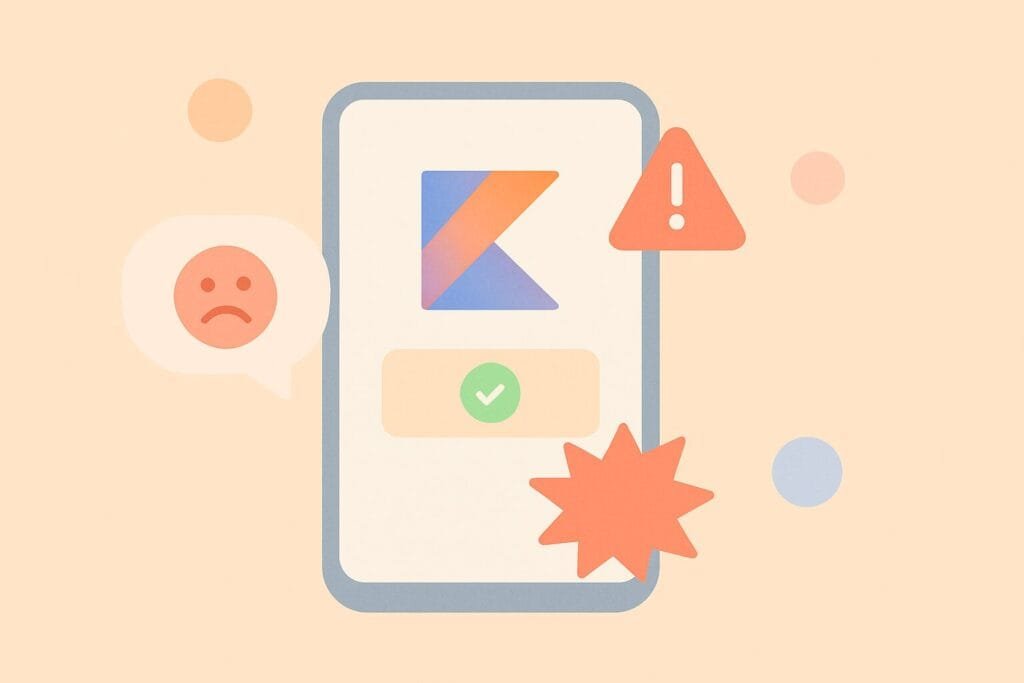When building Android apps using Kotlin, handling permissions is a critical part of the development process, especially from Android 6.0 (Marshmallow) and above. A common issue that developers face is that the Kotlin app crashes after granting permission—particularly runtime permissions like camera access, storage, location, or microphone.

In this guide, we’ll break down why this happens, how to reproduce the issue, and how to fix it using a practical example with Kotlin and Android Studio.
Common Scenario
Let’s say you’re requesting camera permission. You’ve added the correct permission in the AndroidManifest.xml and you’ve implemented a permission request dialog. Once the user grants the permission, the app crashes unexpectedly. Here’s why that might happen:
Why Does the Kotlin App Crash After Granting Permission?
- Null or Late Initialization
After permission is granted, you might be calling a method or initializing a component (e.g., Camera or LocationManager) that is not ready yet. - Activity or Fragment Restart
Granting permission may recreate your activity, and some variables or views might be null duringonResume()oronActivityResult(). - Code Execution Timing
Some developers execute permission-dependent logic immediately afteronRequestPermissionsResult, before the system has fully applied the permission. - Not Checking Permission Again
Some devices or OS versions may require rechecking the permission before using the related feature.
Real-World Example: Camera Permission Crash
Let’s walk through a complete example and fix the crash step-by-step.
Step 1: Add Permission to AndroidManifest.xml
<uses-permission android:name="android.permission.CAMERA" />
Step 2: Request Permission in Kotlin
private val CAMERA_PERMISSION_CODE = 100
private fun checkCameraPermission() {
if (ContextCompat.checkSelfPermission(this, Manifest.permission.CAMERA)
!= PackageManager.PERMISSION_GRANTED
) {
ActivityCompat.requestPermissions(this,
arrayOf(Manifest.permission.CAMERA), CAMERA_PERMISSION_CODE)
} else {
openCamera()
}
}
Step 3: Handle Permission Result
override fun onRequestPermissionsResult(
requestCode: Int,
permissions: Array<out String>,
grantResults: IntArray
) {
super.onRequestPermissionsResult(requestCode, permissions, grantResults)
if (requestCode == CAMERA_PERMISSION_CODE) {
if (grantResults.isNotEmpty() && grantResults[0] == PackageManager.PERMISSION_GRANTED) {
// This is the critical part - wait for UI to be ready
Handler(Looper.getMainLooper()).post {
openCamera()
}
} else {
Toast.makeText(this, "Camera Permission Denied", Toast.LENGTH_SHORT).show()
}
}
}
Step 4: Open Camera Function
private fun openCamera() {
Toast.makeText(this, "Camera opened successfully", Toast.LENGTH_SHORT).show()
// You can initiate CameraX, or camera intent here
}
Simulate the Crash
You can simulate the crash by calling openCamera() directly after the permission result without checking the UI state. For example:
Best Practices to Avoid Crash After Granting Permission
- Always check if the activity is still valid before accessing UI or system services.
- Use
HandlerorlifecycleScopeto delay execution slightly. - Re-check permission before using sensitive features.
- Keep view initialization logic in
onCreateoronResumerather than in the permission callback.
Alternative with Kotlin Coroutines (Using lifecycleScope)
lifecycleScope.launch {
delay(200)
openCamera()
}
This ensures the camera-opening function is not executed immediately after granting permission.
Bonus: Handle Multiple Permissions Safely
private val permissions = arrayOf(
Manifest.permission.CAMERA,
Manifest.permission.READ_EXTERNAL_STORAGE
)
private fun requestMultiplePermissions() {
val missingPermissions = permissions.filter {
ContextCompat.checkSelfPermission(this, it) != PackageManager.PERMISSION_GRANTED
}
if (missingPermissions.isNotEmpty()) {
ActivityCompat.requestPermissions(this, missingPermissions.toTypedArray(), 101)
} else {
startCameraWithStorageAccess()
}
}
Summary Table
| Problem | Cause | Solution |
|---|---|---|
| App crashes after permission | Activity not ready / null views | Use delay/Handler/lifecycleScope |
| NullPointerException on View | View was not initialized after recreate | Initialize view properly |
| Camera not opening after permission | Calling before permission applied | Recheck permission post result |
Conclusion
If your Kotlin app crashes right after granting permission, chances are it’s a timing issue or a misplaced logic block. Always ensure that any functionality relying on permissions is executed after the system and UI are completely ready.
By following these patterns and using Kotlin features like Handler, lifecycleScope, and proper null-safety checks, you can ensure a stable and crash-free experience for your users.

